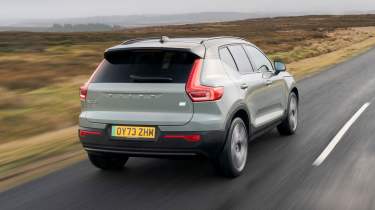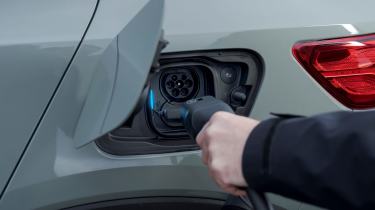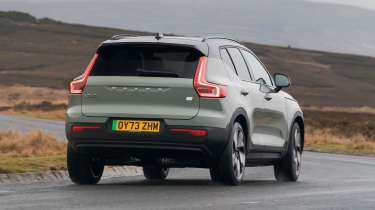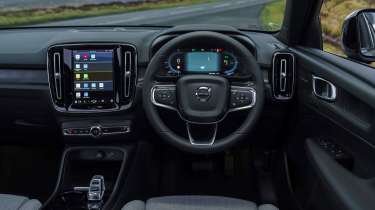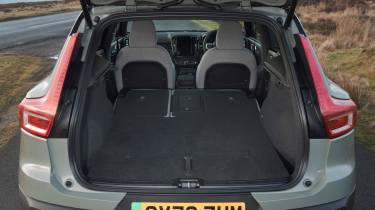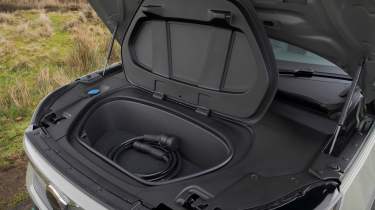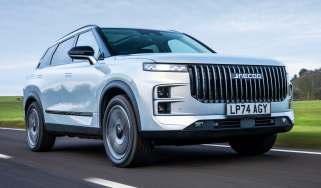Volvo EX40 review – the re-badged electric XC40 is a posh family EV
"The Volvo XC40 Recharge has been renamed EX40, but it’s still a comfortable and spacious electric SUV, that’s also it's quite a bit more expensive than the petrol model"
Pros
- Low running costs
- Comfortable ride
- Practical
Cons
- Rivals more fun to drive
- Some cheap-feeling trim
- Top models are expensive
Verdict – is the Volvo EX40 a good car?
The Volvo XC40 Recharge Electric has been given a simple new name – Volvo EX40 – and it’s still a smooth and refined electric SUV, but top-spec dual-motor models are eye-wateringly expensive. Pick a top Twin Motor version and it puts the family EV within striking distance of bigger and even more premium SUVs. Updates in early 2023 made all cars more efficient, and those with the bigger battery now get a Tesla-rivalling 300-plus-mile range. Single Motor Extended Range cars in one of the lower trims offer the best value for money, and they’re easily the pick of the bunch. In Core or Plus trim the EX40 is worthy of your consideration if you’re after a left-field, upmarket alternative to the raft of mainstream electric family SUVs.
Volvo EX40 models, specs and alternatives
The Volvo XC40 Recharge Electric was the Swedish brand’s first fully-electric car. It was later joined by the Volvo C40 – a coupe version of this compact electric SUV – and in 2024 these two models were renamed Volvo EX40 and EC40, respectively. This was to fit with the brand’s naming strategy for EVs, which has also expanded to include the entry-level Volvo EX30 small SUV and the larger Volvo EX90 electric SUV flagship. With more full EV models in the pipeline, Volvo is expecting half of its sales to be fully electric cars by 2025.
More reviews
If you want a more affordable petrol or plug-in hybrid version of the EX40, that’s still on sale with the same Volvo XC40 name as before. The electric EX40 that we’re concerned with here has a broad range of rivals. The Ford Mustang Mach-E and Kia EV6 are intended to be more rewarding as driver’s cars, while the Skoda Enyaq is a more mainstream option that’s both cheaper and more practical. The comfort and luxury-focused EX40 is a more direct competitor against high-end electric SUVs like the Genesis GV60, Audi Q4 e-tron, Lexus RZ and Tesla Model Y, particularly in Twin Motor guise.
 Top 10 best electric SUVs – the ones to buy in 2025
Top 10 best electric SUVs – the ones to buy in 2025
In terms of size, the Volvo EX40 sits between the smaller Kia Niro EV and Jaguar I-Pace, offering just enough space for most families. It’s expensive, however; the EX40 has a hefty price tag of just under £46,000 for the entry-level single-motor version, so it might not be convincing enough to choose over the cheaper Tesla Model Y. However, the EX40 is competitive versus the BMW iX1, which also starts from over £46,000.
The price gap between the petrol and electric Volvos used to be even bigger, but buyers can now choose from either a cheaper single-motor car or a dual-motor model offering all-wheel-drive to broaden its appeal. An update in 2023 saw the single-motor variant switch from front to rear-wheel-drive; output now stands at 235bhp and a 67kWh battery provides a range of up to 296 miles – (previously up to 264 miles).
A further update in 2025 has brought a larger battery to the Single Motor Extended Range model, increasing in capacity from 75kWh to 79kWh. That means range has also increased from 343 to 358 miles on a charge.
With a motor on each axle, the all-wheel drive Twin Motor version has a range of up to 332 miles from the same battery, with a potent 402bhp on tap. It rockets from 0-62mph in 4.8 seconds and has a limited top speed of 112mph but its chassis feels at odds with the acceleration on offer, favouring a comfortable ride over razor-sharp handling.
With no combustion engine sucking in air, the main visual difference between the EX40 and regular XC40 models is the blocked-off front grille. There are some different colours available, and the aero-optimised wheels are unique to the EV. The differences inside are subtle too, with materials made from recycled plastic bottles, for example, highlighting Volvo’s commitment to sustainability.
For years the Volvo was offered with just three main trim levels: Core, Pro and Ultra – in 2025, however, the Swedish brand introduced a Plus Pro trim, slotting just above Pro. Base Core models get features like 19-inch alloy wheels, two-zone climate control, LED headlights and textile fabric-trimmed seats.
Opt for the Plus model and powered seats, a rear parking camera and LED fog lights are fitted, while Plus Pro introduces pixel LED headlights, LED front foglights with a cornering function, as well as a 360-degree parking camera.
The range-topping Ultra trim adds luxury features like a premium stereo system and a panoramic roof – as well as slightly more upmarket trim, including an Orrefors Crystal gear knob. Currently, Black Edition versions of Plus and Ultra are also offered, adding black exterior trim and 20-inch alloy wheels, and only available with Onyx Black exterior paint.
Practicality is largely unchanged from the standard XC40, so there's still enough space for adults in both rows of seats. The boot offers 452 litres, which is almost identical to the Kia Niro, and there's also a 31-litre 'frunk' under the bonnet that’s ideal for the charging cable.
MPG, running costs & CO2
The Volvo EX40 comes with two battery options. The smallest of these is the 67kWh in size, and in 2023 the EX40 (then badged XC40 Recharge) changed from front to rear-wheel drive, which improved range. Now it boasts a respectable range of up to 296 miles on a charge.
Above this Volvo offers a larger Single Motor Extended Range model, which was updated in 2025 with a larger battery going from 72kWh to 75kWh and providing a range of up to 358 miles, which is around 15 miles more than before. The price difference between Core Single Motor and Single Motor Extended Range models is less than £2,000, so it’s definitely worth considering, especially since the difference in monthly payments on a finance deal could be minimal. The EX40’s max range figure is farther than you can go in a Kia Niro EV (305 miles), but not as far as the 379 miles of the Renault Scenic.
The top-of-the-range Twin Motor variant uses the same larger battery, but because of the extra power on offer, efficiency takes a slight hit, so range maxes out at 332 miles. At over £11,000 more than the entry-level Core Single Motor, the Twin Motor really doesn’t look like it’s worth it, so most buyers will be best served by the Single Motor Extended Range.
Charging speeds have massively improved since the EX40 first launched as the XC40 Recharge. All versions used to max out at 150kW, but now all models can be topped up at max speeds of 250kW, meaning a 0-80% charge could take as little as 26 minutes for the Single Motor model, or 28 minutes for the Single Motor Extended Range and Twin Motor variants. Charging from a home wallbox takes longer, but with speeds of 11kW possible, the Single Motor could take just seven hours, while the larger-battery versions take an hour longer.
All EX40 owners can make use of Volvo’s Range Assistant app on the main screen. This helps drivers keep track of the range available, and optimise it with smart energy management and advice on driving efficiently. A range optimiser can set the climate control to improve range, which is especially handy on longer trips. Frustratingly, on older cars, you’ll need to use the Range Assistant to display the remaining range – the 2023 update duplicated this information in the digital instrument cluster; Volvo was debating whether to add this to other models via an over-the-air (OTA) update.
Since changes to the VED (road tax) system came into effect from April 2025, the EX40, along with all EVs, is now liable to pay £10 in the first year and then the standard blanket rate from the second year onwards, currently set at £195. Unfortunately, EVs are also no longer exempt from the luxury car surcharge, which affects models costing over £40,000 – as all EX40s fall into that category, they will all incur the extra charge from the second to sixth years of the car’s life.
Engines, drive & performance
Volvo has a reputation for being eminently sensible, yet its small electric crossover has a mighty 402bhp if you go for the dual-motor all-wheel drive Twin Motor model. We can only imagine Volvo wanted its first-ever EV to hit showrooms with a bang; acceleration from 0-62mph in under five seconds might be an impressive party trick, but it feels somewhat surplus to requirements in the EX40. Surprising then, that for 2024 there’s even a software-based optional power upgrade to 442bhp. We think the less-powerful single-motor version is a better bet for most buyers.
An update in 2023 saw the single-motor variant of the EX40 swap from front to a sportier rear-wheel-drive setup and power increase slightly to 235bhp (248bhp in the Extended Range). From a standstill, both versions will reach 62mph in a respectable 7.3 seconds, although the instant torque from the electric motor makes it feel even faster.
If you didn’t know (or didn’t care) you’d be hard-pressed to tell the new rear-drive car apart from its front-driven predecessor; it’s only really noticeable when you push hard away from a junction, or when accelerating out of a tight bend. Contrary to what you might think, separating the steering and power inputs across the front and rear wheels means the updated car feels a bit grippier.
While the EX40 can’t quite match a Tesla for sheer acceleration, all versions will push you back in your seat if you step on the accelerator. Despite the low centre of gravity created by the positioning of the battery, there’s a decent amount of body lean when cornering at high speeds, which highlights the car’s relaxed nature.
Volvo has done a good job of keeping the suspension compliant, though; while range-topping dual-motor cars get an adaptive setup, even the standard springs provide an incredibly supple ride. Even with 20-inch alloy wheels fitted, we were surprised with how comfortable the Volvo was, and it’s even better with smaller wheels. Still, the Lexus RZ just edges the Volvo for comfort overall.
There aren't any paddles behind the steering wheel to adjust regenerative braking, with Volvo instead choosing a Tesla-style toggle in the infotainment menu to switch between coasting or one-pedal driving. The latter is strong (and initially quite aggressive) but it’s relatively easy to get used to and works well in urban driving.
Interior & comfort
Inside, it's hard to get away from the fact that this car, which can cost more than £56,000, shares much of its interior with the considerably cheaper entry-level petrol model. There are certainly more lavish interiors for the price tag but here you are paying a premium for the clever powertrain and large battery.
The biggest highlight of the cabin has to be the technology buried within. The infotainment setup runs Google-based software and is also compatible with Apple CarPlay and Android Auto, although it’s worth noting that Apple devices need a cable to connect. It’s a shame that it all operates via a small nine-inch touchscreen – the system definitely doesn’t have the wow factor of a Tesla or BMW’s slick single-pane widescreen setup – but it is at least responsive and relatively easy to use.
Sitting behind the steering wheel is a larger 12-inch digital instrument cluster which can be configured to show several useful nuggets of information such as your current sat-nav directions. Recent updates allow greater customisation of the display – including additional map options, and the ability to display range alongside remaining battery percentage.
Elsewhere, subtle design changes over the regular XC40 include door linings and carpets that are now made from 97% recycled plastic bottles. Extra paint finishes are also available, along with new 19 and 20-inch alloy wheel designs.
Every version from the entry-level EX40 Core has LED headlights, a 12.3-inch driver’s display, nine-inch infotainment display, front and rear parking sensors with a rear-view camera, wireless smartphone charging, DAB radio, keyless entry and start, a powered bootlid, automatic wipers and textile-trimmed seats, along with 19-inch alloy wheels.
Above this, the Plus model adds keyless entry, a hands-free powered tailgate, ambient interior lighting, a heated steering wheel and heated rear seats, fog lamps, adaptive cruise control with lane centring, and diamond-cut 19-inch alloy wheels, plus a contrasting black roof. A heat pump is also included on this model, which helps to condition the battery and keep it at optimal operating temperatures to conserve range in more wintry weather conditions.
Volvo added a Plus Pro trim in 2025, bringing a 360-degree camera, pixel LED headlights and foglights with a cornering function. The flagship Ultra version adds to the standard kit list further with 20-inch alloy wheels, Microtech-trimmed seats, a powered tilt and slide panoramic sunroof, and an upgraded Harman Kardon stereo with 12 speakers. Luxuries that, we think, most buyers might struggle to justify.
Volvo is also offering the Black Edition, which adds 20-inch gloss black alloy wheels, black exterior trim (including the front grille), a Performance driving mode for Twin Motor cars and only comes with Onyx Black paint, for a truly stealthy look.
Practicality & boot space
The EX40 is bigger than the Hyundai Kona Electric but smaller than a Jaguar I-Pace, so it should be reasonably roomy for small families. Four adults can certainly get comfortable, and the SUV's tall roof means there's plenty of headroom, even with the panoramic sunroof fitted to flagship Ultimate cars.
Its rear seats only split 60/40, rather than the 40/20/40 arrangement of some premium models, but the 452-litre boot is a good size, and there’s a deep hidden compartment under the floor. The tailgate opening is a square shape and the EV is no less practical than other versions of the XC40, which is impressive given the large battery. Thanks to the lack of a petrol engine, there's also an extra 31 litres of 'frunk' space under the bonnet, which we found handy for storing the charging cables or small bags of shopping.
Reliability & safety
Volvo is an industry leader when it comes to safety, and the manufacturer has completely redesigned and strengthened the crash structure of the EX40 to account for the layout change.
The battery comes inside a protective case in the middle of the car, where it's protected from impacts in a collision. Sensors behind the front grille feed data to Volvo's latest Advanced Driver Assistance Systems (ADAS), which can recognise cars, cyclists, pedestrians and large animals. While it won't be tested separately, the EX40 is expected to share the standard XC40's five-star Euro NCAP safety rating.
The Volvo XC40 came in 32nd place in our 2024 Driver Power customer satisfaction survey of the top 50 cars on sale in the UK. Owners rated its interior and comfort very highly, and were also impressed with its practicality, road manners and infotainment system. It came 21st out of 50 cars for reliability and build quality, but was near the very bottom for economy and running costs, which should be less of a problem for the electric EX40.
As a manufacturer, Volvo came 16th out of 32 brands in 2024. Slightly worryingly, however, was that 26% of owners reported a fault within the first year. True to its reputation, interior style and finish was deemed a high point, along with exterior styling, but Volvo came near the bottom of the heap for running costs and value for money.
Visit our sister site Auto Express for an alternative view on the Volvo EX40...
Which Is Best?
Cheapest
- Name175kW Single Motor Core 69kWh 5dr Auto
- Gearbox typeAuto
- RRP£46,250
Most Economical
- Name185kW Extended Range Core 82kWh 5dr Auto
- Gearbox typeAuto
- RRP£48,000
Fastest
- Name325kW TM Perf Plus Black Edition 82kWh 5dr Auto
- Gearbox typeAuto
- RRP£60,190

